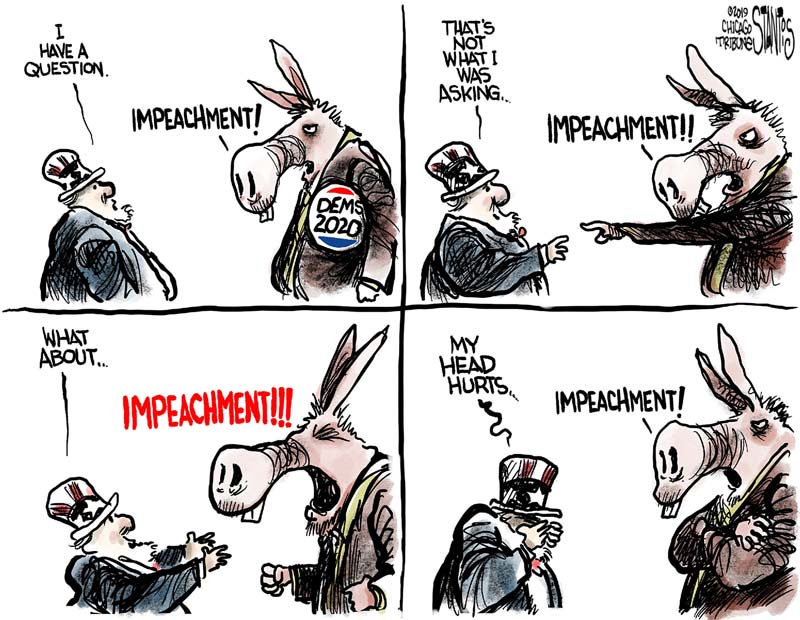
Re-Pete’s is my kind of place, although I’ve yet to visit and owe the recommendation to the journalist Mark Halperin. The regular menu states: “Water is free, too bad the beer isn’t!” The motto above the seafood section is: “Catch & release . . . into the grease!”
Halperin’s high-flying career was derailed by accusations of sexual harassment at the height of the #MeToo campaign. But he has made his apologies — for past transgressions that were indefensible but not criminal — and is now back.
Last week he observed that if the hunting types in Re-Pete’s were glued to the impeachment hearings then “the Democrats have a very strong chance of making their public case to the American people”. So on Wednesday afternoon, he rang Re-Pete’s.
MH: “Do you have the impeachment hearings on the TVs there?”
Guy from Re-Pete’s: “The what? No, we do sports stuff.”
The point is that the impeachment of Trump — the prospect of which consumes at least three-quarters of the attention of the coastal elites who watch CNN and read The New York Times — matters only if voters in swing states such as Wisconsin give a damn.
From the vantage point of Nancy Pelosi, the Speaker of the House of Representatives, this is not the road she wanted to go down, much less the hill she wanted to die on. Throughout the months when Washington lived for the release of former FBI director Robert Mueller’s report, she did her best to dampen the ardour of her fellow Democrats.
For younger legislators, as for today’s millennial journalists, impeachment is a magical word, conjuring up memories of All the President’s Men. The veteran Pelosi, by contrast, knows that Trump isn’t Richard Nixon and “Dniepergate” isn’t Watergate. But the president left her no choice.
No sooner had the Mueller report fizzled out than Trump picked up the phone and tried to get the Ukrainian president, Volodymyr Zelensky, to gather opposition research on the Democratic candidate Joe Biden in return for a presidential meeting and (although this was not initially clear to Zelensky) US military assistance.
Only when the quid pro quo was going to be made public — courtesy of a CIA agent who decided to blow the whistle — did the White House release the military aid.
The three previous presidential impeachments — of Andrew Johnson, Nixon and Bill Clinton — lasted 94, 186 and 127 days respectively. Now, you may want to spend the next three to six months glued to your television. I don’t, any more than the regulars at Re-Pete’s. There’s no need, anyway, because we know what’s going to happen. First, the House will vote to impeach the president, probably along party lines. The Republican Senate majority will then have to decide if it needs to hold a trial.
In theory, the Republicans could simply vote to dismiss the House’s case. But it seems more likely that the Senate leader, Mitch McConnell, will go ahead with a trial (or at least let one begin), though with the intention of acquitting the president.
By the time it’s all over, the Democratic primaries will probably be under way. All that will matter for the subsequent nine months will be how much the impeachment process has hurt Trump in battleground states such as Wisconsin.
True, as the constitutional lawyer Philip Bobbitt argues in his indispensable new edition of Charles Black’s classic book Impeachment, it is incorrect to think of impeachment as a purely political device. If it were, it would surely have been used much more often. The two-thirds threshold for conviction in the Senate all but requires that a successful impeachment be bipartisan.
The House must base an impeachment bill on the constitution, which specifies that a president may “be removed from office on impeachment for, and conviction of, treason, bribery or other high crimes and misdemeanours”. It’s another common mistake to think that this requires a president to have committed a criminal act in the ordinary sense. What the framers of the constitution had in mind, Bobbitt argues, were “the [unique] constitutional crimes that can be committed [only] by a president” — such as seeking foreign assistance in a US presidential election.
The Democrats have dropped “quid pro quo” since the public hearings began, calculating that Latin is not much spoken in places such as Black River Falls. Now their case against Trump is all about bribery. But, says Bobbitt, for bribery to be an impeachable offence it must “be an act that actually threatens the constitutional stability and security of the state . . . one that puts the constitution in jeopardy”.
In the words of Alexander Hamilton, impeachment is a “national inquest”. It is concerned with constitutional violations and, Bobbitt argues, “has no particular policy purpose other than protecting the state”. It is not a criminal proceeding, which is why double jeopardy does not forbid the subsequent trial of an impeached official, including a president.
On that basis, is it likely these hearings will generate enough evidence of constitutional crimes to persuade 20 Republican senators to vote for impeachment? I would doubt it. But might enough voters be turned off Trump to prevent his re-election in November? That’s a more interesting question. After all, re-election would mean four more years of Trump making US foreign policy on the Ukrainian model — and without the constraints that were imposed on him by the bureaucratic and military establishments in his first term.
To judge by the latest opinion polls, registered Democrats are overwhelmingly for impeaching and removing Trump, whereas nine in 10 Republicans agree with the president that this is a witch-hunt by the deep state and the do-nothing Democrats. But what about independent voters, who these days account for more than two-fifths of the electorate?
Fewer than a third of them thought the acts revealed by the Mueller report justified Trump’s impeachment and removal. However, that proportion has risen since the partial transcript of the Trump-Zelensky telephone call was released. The latest polls suggest that between 43% and half of independents now favour impeachment and removal. I detect a realisation that in his dealings with Ukraine this year the president came much closer to committing a constitutional crime, in Bobbitt’s sense, than in his previous conduct.
They may not be watching the hearings in Re-Pete’s Saloon & Grill, but they can smell something fishy cooking in the Washington grease. And that might turn out to matter more than we now realise in 352 days’ time, when Americans get to decide if Trump got caught — and whether he should be released or deep-fried.
(COMMENT, BELOW)
Niall Ferguson's latest book is "The Square and the Tower: Networks and Power from the Freemasons to Facebook."
(Buy it at a 50% discount by clicking here or order in KINDLE edition at a 74% discount by clicking here). He is the Milbank Family Senior Fellow at the Hoover Institution, Stanford University, and a senior fellow of the Center for European Studies, Harvard, where he served for twelve years as the Laurence A. Tisch Professor of History.


 Contact The Editor
Contact The Editor
 Articles By This Author
Articles By This Author